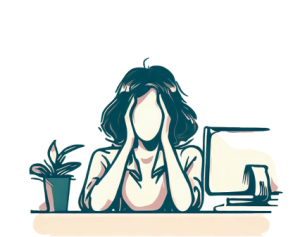Anxiety is a common mental health condition that can significantly affect productivity. Understanding how anxiety influences the brain and body can be a powerful tool in managing symptoms and improving efficiency.
Anxiety and productivity share a complex relationship. As the renowned author and psychiatrist Edward Hallowell puts it, “Worry is a thin stream of fear trickling through the mind. If encouraged, it cuts a channel into which all other thoughts are drained.” This vivid imagery encapsulates how anxiety can hijack our mental resources, leaving little room for productive thoughts and actions.
How Anxiety Affects Brain Function
Anxiety’s impact on brain function is profound and multifaceted:
1. Hippocampus alterations: This crucial brain region, responsible for memory and learning, can be structurally and functionally altered by chronic anxiety.
2. Disrupted neural communication: Anxiety can impair the smooth flow of information between different brain areas.
3. Neurotransmitter imbalances: Anxiety often leads to changes in key brain chemicals, affecting mood regulation and cognitive function.
These changes can make it challenging for people with anxiety to control emotions, make rational decisions, and retain information. However, neuroscientist Joseph LeDoux offers hope: “Once you understand the biology of anxiety, you can see there are ways to change the brain, and those changes can be life-altering.”

The Impact of Anxiety on Productivity
Reduce focus and concentration
During anxious moments, our minds often stray from the present, making it challenging to focus on tasks. This wandering mind can result in errors, missed deadlines, and a notable decline in overall productivity. As productivity expert David Allen notes, “Much of the stress that people feel doesn’t come from having too much to do. It comes from not finishing what they’ve started.”
Cause procrastination
Anxiety can trap individuals in a cycle of procrastination, fueled by fear of failure and perfectionism. This perpetuates a vicious cycle, as procrastination further exacerbates anxiety symptoms. Author Timothy A. Pychyl aptly observes, “Procrastination is an emotion regulation problem, not a time management problem.”
Interfere with decision-making
When anxiety takes hold, our thinking becomes clouded, making it difficult to arrive at rational decisions. This impairment can create a ripple effect that detrimentally impacts our productivity across various aspects of life.

Strategies to Manage Anxiety and Productivity
Identify your triggers
Pay close attention to your thoughts, feelings, and environment to pinpoint anxiety triggers. Once identified, develop personalized coping strategies. As psychologist Edmund J. Bourne suggests, “The key to overcoming anxiety is to take charge of your recovery and to develop a comprehensive plan.” You can Keep an anxiety journal to track patterns and identify triggers more effectively.
Exercise regularly
Physical activity is a powerful anxiety-buster and productivity booster. According to Dr. John Ratey, author of “Spark: The Revolutionary New Science of Exercise and the Brain,” “Exercise is like taking a little bit of Prozac and a little bit of Ritalin because, like the drugs, exercise elevates these neurotransmitters.”
Mindfulness and meditation
Research published in the journal Frontiers in Human Neuroscience revealed that just 10 minutes of mindfulness meditation can significantly enhance cognitive control and alleviate anxiety. Try the “5-4-3-2-1” grounding technique: Acknowledge 5 things you see, 4 things you feel, 3 things you hear, 2 things you smell, and 1 thing you taste.
Get enough sleep
Sleep deprivation can exacerbate anxiety symptoms and impair cognitive function. Arianna Huffington, in her book “The Sleep Revolution,” emphasizes, “Sleep is the ultimate performance enhancer.” Aim for 7-8 hours of restful sleep per night to manage anxiety, improve focus, and increase decision-making.
Practice self-compassion
Be kind to yourself when anxiety strikes. Psychologist Kristin Neff highlights that self-compassion is about treating ourselves with the same kindness we extend to others. Develop a self-compassion mantra, such as “I am doing my best, and that is enough.”
While anxiety is a normal emotion that everyone experiences, persistent or debilitating anxiety warrants professional help. As author Matt Haig beautifully puts it, “You don’t have to control your thoughts. You just have to stop letting them control you.”
By understanding anxiety’s impact on productivity and implementing these strategies, you can navigate the challenges more effectively and reclaim your productive potential. Your journey to managing anxiety and boosting productivity is unique – be patient with yourself and celebrate every small victory along the way.




